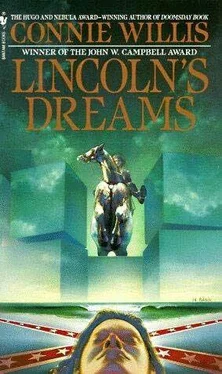Connie Willis - Lincoln’s Dreams
Здесь есть возможность читать онлайн «Connie Willis - Lincoln’s Dreams» весь текст электронной книги совершенно бесплатно (целиком полную версию без сокращений). В некоторых случаях можно слушать аудио, скачать через торрент в формате fb2 и присутствует краткое содержание. Город: New York, Год выпуска: 1992, ISBN: 1992, Издательство: Bantam Books, Жанр: Фантастика и фэнтези, на английском языке. Описание произведения, (предисловие) а так же отзывы посетителей доступны на портале библиотеки ЛибКат.
- Название:Lincoln’s Dreams
- Автор:
- Издательство:Bantam Books
- Жанр:
- Год:1992
- Город:New York
- ISBN:978-0553270259
- Рейтинг книги:3 / 5. Голосов: 1
-
Избранное:Добавить в избранное
- Отзывы:
-
Ваша оценка:
- 60
- 1
- 2
- 3
- 4
- 5
Lincoln’s Dreams: краткое содержание, описание и аннотация
Предлагаем к чтению аннотацию, описание, краткое содержание или предисловие (зависит от того, что написал сам автор книги «Lincoln’s Dreams»). Если вы не нашли необходимую информацию о книге — напишите в комментариях, мы постараемся отыскать её.
presents the story of a young historical researcher who is being pulled deeper and deeper into the time of the Civil War.
Lincoln’s Dreams — читать онлайн бесплатно полную книгу (весь текст) целиком
Ниже представлен текст книги, разбитый по страницам. Система сохранения места последней прочитанной страницы, позволяет с удобством читать онлайн бесплатно книгу «Lincoln’s Dreams», без необходимости каждый раз заново искать на чём Вы остановились. Поставьте закладку, и сможете в любой момент перейти на страницу, на которой закончили чтение.
Интервал:
Закладка:
I ran out of Elavil again, but I didn’t call the doctor back. I didn’t dream very much, and when I did, Annie wasn’t in the dreams. I dreamed of a place I’d never seen before, a place with green hills and white fences. For some reason, I thought it was in West Virginia.
In February I found out what had happened to Willie Lincoln. He had been buried at Oak Hill Cemetery in Georgetown, in a vault belonging to William Thomas Carroll, a clerk of the Supreme Court and a friend of the Lincolns.
The information was in a biography of Mary Todd Lincoln at the branch library, and when I read it, I slammed the book shut, grabbed it up, and went running out. Alarms clanged, and Kate ran out on the steps and shouted after me, “Jeff, are you all right?” I didn’t answer her. I leaped in the car and went tearing out to the cemetery.
The narrow roads between the graves were blocked with snow so deep most of the gravestones were buried, but I got out of the car and walked through the snow to the tomb and looked at it, as if I thought Willie was still there, as if I thought, disturbed out of his sleep, he would tell me where Annie was and what had happened to her.
But he wasn’t there. He was in Springfield, lying beside his father. I had thought that finding his grave would tell me what had happened to Willie, but I already knew that, didn’t I? It was the same thing that had happened to all of them—Ben and Tom Tita and Little Hen. They had died in the war. Willie’s pony had been burned alive and Annie Lee had died of a fever, but they were Civil War dead, and they were all buried together at Fredericksburg, along with Stonewall Jackson’s arm, under a numbered granite square no larger than a scrap of paper. I knew what had happened to all of them except Annie. And Traveller. So I walked back through the snow and went home and sot out Freeman.
I knew that Traveller had outlived Lee because I remembered reading that he was part of Lee’s funeral procession, but there was no mention of him after that in the last chapter of Freeman and nothing at all about him in Davis or even Robert E. Lee, Jr.’s recollections of his father.
I went downstairs to the solarium and found Sanborn’s Robert E. Lee , I went back up to the study and sorted through the stacks of books Broun had piled on his desk and the leather chair, looking for any mention of Traveller. Pierson mentioned almost in passing that Traveller had been boarded out at a friend’s farm because Mrs. Lee was too ill to care for him. Lovesey’s Man and Horse said he had “lived on for two years, waiting faithfully for the master who would never come again.” Hinsdale said he was kept on at the stable Lee had built for him until he picked up a nail, contracted lockjaw, and had to be shot.
I looked at that for a while and then went back to the last chapter of Freeman, though I already knew everything there was to know: Traveller had had the misfortune to outlive the person he loved, he had waited for nearly two years, and where he had been those two years didn’t matter any more than where Willie Lincoln had spent those last three years of the war, and then he had died. Freeman couldn’t tell me any more than that, but I went back anyway, writing down the page numbers after “Traveller” in the index as if they were the Roll of Honor numbers on some soldier’s grave, because I couldn’t face the idea that Freeman, who had loved Lee enough to write four volumes about him, would have forgotten Traveller, and he hadn’t.
It was in one of the appendices in volume one. He wrote that Traveller had died of lockjaw and been buried on the grounds of Washington and Lee University. His bones had been disinterred by the Daughters of the Confederacy and put in the basement of the Lee Memorial Chapel. Near Lee’s tomb.
In March I took Broun to see his doctor, and he got a clean bill of health.
“He told me I could do anything I wanted, climb stairs, write a book,” he said on the way home. “I want to write a book about Robert E. Lee.” He waited to see what I would say.
“And Traveller,” I said.
“Of course Traveller.”
We started work on the new book. Broun sent me out to Arlington to take notes on the porch and the parlor and the attic where Tom Tita had been imprisoned. There was going to be a military funeral in the afternoon, and they had blocked off the drives. I had to park the car in the visitors’ parking lot and walk up the hill. It was a warm day, the first one in over two months, and the snow that had fallen in February was just now starting to melt. The water ran in rivers along the curving drives.
Custis Walk was blocked off, too. I had to cut across the grass to get to Arlington House. I made it as far as the grave. The workmen had trampled the snow down till you could see the grass in places. They had used a backhoe to dig the grave, heaping dirty snow at the sides, and it was melting, too, and running across the grass and the snow in muddy rivulets.
The workmen had gone off to eat lunch or smoke a cigarette. They had left a metal clipboard lying under a tree on the far side of the grave, with a piece of paper clipped to it. It would have the name of who the grave was for written on it, and I wanted to walk over to the tree and read it, but I was afraid that I would not be able to get back, that the ground would give way, and I would step on all their mangled bodies.
“It has something to do with Arlington and the unknown soldier and a message,” Annie had said, trying to understand the dreams. “I think he was trying to atone,” and I should have asked her, “How is he trying to atone?” instead of shouting at her. Because of course the dreams were an atonement.
He was trying to warn her. His daughter Annie had died, and he hadn’t been able to do anything to save her. He hadn’t been able to save any of them. Stonewall Jackson or the ragged soldiers he had to keep sending back into battle, or the Confederacy. But he could save Annie. She reminded him of his daughter, and she was twenty-three years old. He was trying to warn her.
The dreams were terrifying, full of images of death and dying. They were meant to frighten her, to make her go see a doctor before it was too late, a warning as clear, as easy to interpret as Lincoln’s dreams of himself in a coffin, only nobody saw it. Except Annie, and she wouldn’t listen.
“It’s the war,” Broun had said. “People do things like that in a war, sacrifice themselves, fall in love.” They had been together night after night, through battle after heartbreaking battle. She was bound to fall in love with him, wasn’t she? And then, even though she knew the dreams were a warning, even though the warnings got plainer and more terrifying, Lee willing even to dream Appomattox again, to dream his own death for her, to warn her, she couldn’t leave him.
She had stayed with him to the end, as she had promised, and when the snow melted a little more I would be able to see her body, face-down, her arm flung out, still holding on to her Springfield rifle. I leaned against the backhoe, unable to stand.
I could see the square white subway entrances looking like gravestones and beyond them, across the river, the square white tomb of the Lincoln Memorial. I thought about the statue inside, Lincoln sitting with his long legs planted in front of him and his hands on the arms of the chair, looking like a man who has lost a child.
Lincoln had gone out to the cemetery in Georgetown and had the vault opened twice, trying, I think, to convince himself that Willie was really dead, but it hadn’t helped. It hadn’t helped, and he couldn’t sleep, and his grief nearly drove him insane. Until finally, in Broun’s words, Willie’s face had come in dreams to comfort him. As Annie’s face had come to comfort me, though she was dead.
Читать дальшеИнтервал:
Закладка:
Похожие книги на «Lincoln’s Dreams»
Представляем Вашему вниманию похожие книги на «Lincoln’s Dreams» списком для выбора. Мы отобрали схожую по названию и смыслу литературу в надежде предоставить читателям больше вариантов отыскать новые, интересные, ещё непрочитанные произведения.
Обсуждение, отзывы о книге «Lincoln’s Dreams» и просто собственные мнения читателей. Оставьте ваши комментарии, напишите, что Вы думаете о произведении, его смысле или главных героях. Укажите что конкретно понравилось, а что нет, и почему Вы так считаете.












